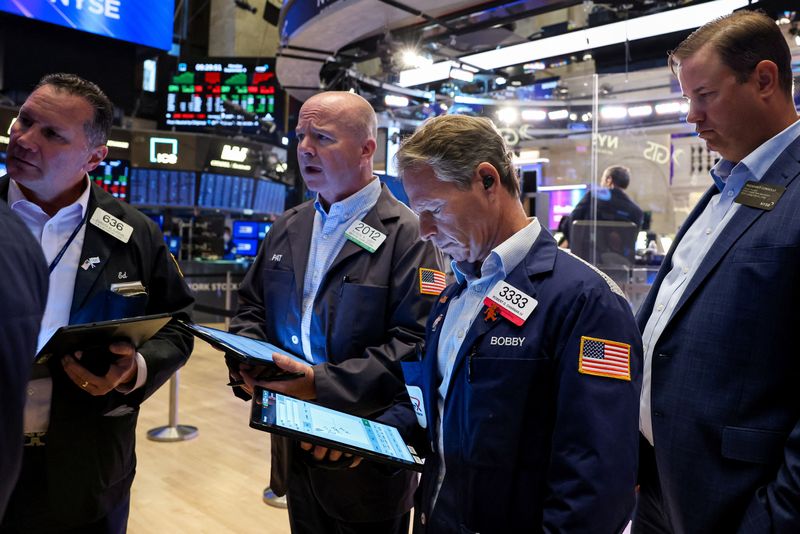A look at the day ahead in U.S. and global markets from Mike Dolan
Wall Street has weathered an edgy start to the final quarter reasonably well this week, with the September employment report now an obvious final hurdle on Friday and firmer oil prices an irritant even as a three-day U.S. ports strike ends.
As has been the case for weeks, markets are trying to find the balance between signs of persistent growth but at a pace soft enough to sustain disinflation and Federal Reserve interest rate cut hopes.
Labor market soundings so far this week certainly support the former, though brisk job growth and the relatively modest oil price pop on Middle East tensions raised some questions over Fed easing speculation.
At least the threat that this week's ports strike may feed retail price rises looks to have been averted. U.S. East Coast and Gulf Coast ports began reopening late on Thursday after dockworkers and port operators reached a wage deal to settle the industry's biggest work stoppage in nearly half a century.
As Chicago Fed boss Austan Goolsbee pointed out on Thursday, retailers and manufacturers had stockpiled about two weeks worth of items in anticipation of the strike and that should be sufficient now the dispute has ended.
This week's crude oil price rise, aggravated by comments from U.S. President Joe Biden on Thursday that Israeli retaliation against Iran's rocket attack could target Tehran's oil facilities, has become a more unpredictable prospect as nerves about weekend events may keep traders on tenterhooks.
Still, despite this week's jump in crude prices, oil prices are only back to where they were a month ago and continue to track annual declines of more than 10%. U.S. retail gasoline prices remain close to eight-month lows.
And so the scene is set for the September payrolls report later on Friday, with consensus forecasts for another 140,000 new jobs last month - close to August's tally - and an unemployment rate steady at 4.2%.
Most of the week's labor updates - private sector payrolls, jobless claims, vacancies and layoffs data - show the jobs market remains in relatively rude health.
So for all the cross-currents this week, the S&P500 has lost little more than 0.5% so far and futures are higher into Friday's open. Implied volatility captured by the VIX index, however, remains elevated at about 20.
The shifting rates picture and background geopolitics is trickier for Treasuries, where 10-year yields have pushed up a net 5 basis points this week to 3.85% - but held close to Thursday's close overnight.
Fed futures pricing, with just 66bp of rate cuts now pencilled in by yearend, is leaning towards two further quarter-point Fed rate cuts this year rather than one of those being another 50bp move.
The dollar has been the big winner all week, not least as central banks around the world turned more dovish on their interest rate signalling just as Fed expectations ebbed.
But the greenback retreated slightly on Friday, partly as sterling clawed back some of the heavy losses suffered when Bank of England governor Andrew Bailey talked on Thursday of more "activist" and "aggressive" BoE easing.
Bailey's comments were dampened on Friday by his chief economist Huw Pill, who said "it will be important to guard against the risk of cutting rates either too far or too fast."
Stock markets around the world were marginally higher on Friday, with Hong Kong's Hang Seng index resuming its recent steep climb on Chinese stimulus plans after a stumble on Thursday. The offshore yuan weakened.
In Europe, attention was focussed on European Union trade negotiations that struggled to find a consensus on raising tariffs of up to 45% on Chinese electric vehicle imports - with Europe's auto sector suffering multiple hits from the rivalry and dragging on region's industrial economy.
With Germany voting against the tariffs because of fears of Chinese retaliation against German carmakers, EU countries failed to vote clearly in favour or against, leaving the European Commission to decide, EU sources told Reuters on Friday.
In a later statement, the Commission said the proposal to impose definitive tariffs has obtained the necessary support - but it would continue negotiations with China "to explore an alternative solution that would have to be fully WTO-compatible."
European auto shares, which had been the worst performing sector this week with losses of almost 7% due to the tariff standoff and mounting profit warnings, jumped back almost 1% on Friday after the reports.
Elsewhere, the latest data on U.S. money market funds showed assets under management jumped again in the latest week to a new record of $6.46 trillion - puzzling some who had expected money to exit these cash-like funds as Fed rate cuts got underway.
Key developments that should provide more direction to U.S. markets later on Friday:
* US September employment report; Mexico August jobless rate

* New York Federal Reserve President John Williams speaks
* US corporate earnings: Apogee Enterprises
(By Mike Dolan, editing by Mark Heinrich; mike.dolan@thomsonreuters.com)